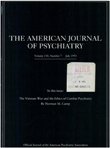Serotonin function and depression: neuroendocrine and mood responses to intravenous L-tryptophan in depressed patients and healthy comparison subjects
Abstract
OBJECTIVE: This study was designed to compare central serotonergic function in depressed patients and healthy comparison subjects by examining neuroendocrine and mood responses to intravenous L- tryptophan. METHOD: One hundred twenty-six drug-free patients with DSM- III-R major depression (109 unipolar, 17 bipolar; 68 melancholic, 58 nonmelancholic; 28 psychotic, and 98 nonpsychotic patients) and 58 healthy comparison subjects participated. After an overnight fast, subjects received an intravenous infusion of L-tryptophan, 7 g. Blood was obtained for determination of serum prolactin, serum growth hormone (GH), and plasma tryptophan levels. Visual analogue scales were used to assess mood. RESULTS: Prolactin responses were blunted in nonmelancholic and higher in melancholic and psychotic depressed patients, while GH responses were blunted in combined unipolar, nonmelancholic, and nonpsychotic depressed patients. Controlling for baseline biological, clinical, and demographic factors eliminated the higher prolactin response in the melancholic and psychotic patients, attenuated the blunted GH response in the unipolar patients, and revealed a blunted GH response in the melancholic patients. Patients and comparison subjects differed on five of 13 mood responses, primarily because of baseline differences. CONCLUSIONS: These findings are consistent with previous studies demonstrating blunted neuroendocrine responses to intravenous L-tryptophan in depression. Restriction of these findings to specific subtypes of depression may reflect a differential role of serotonergic abnormalities in these subtypes.
Access content
To read the fulltext, please use one of the options below to sign in or purchase access.- Personal login
- Institutional Login
- Sign in via OpenAthens
- Register for access
-
Please login/register if you wish to pair your device and check access availability.
Not a subscriber?
PsychiatryOnline subscription options offer access to the DSM-5 library, books, journals, CME, and patient resources. This all-in-one virtual library provides psychiatrists and mental health professionals with key resources for diagnosis, treatment, research, and professional development.
Need more help? PsychiatryOnline Customer Service may be reached by emailing [email protected] or by calling 800-368-5777 (in the U.S.) or 703-907-7322 (outside the U.S.).



